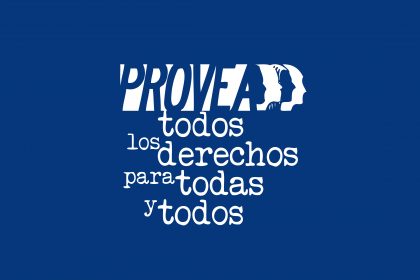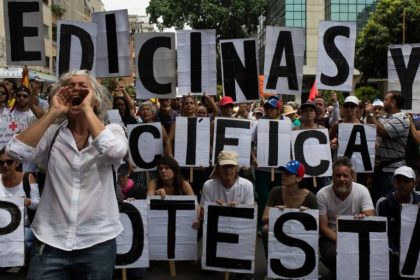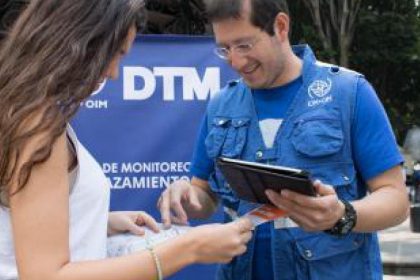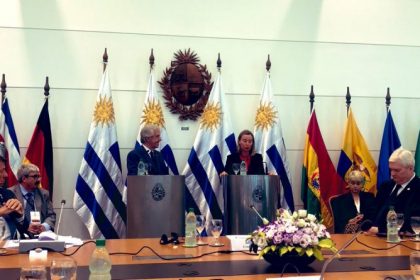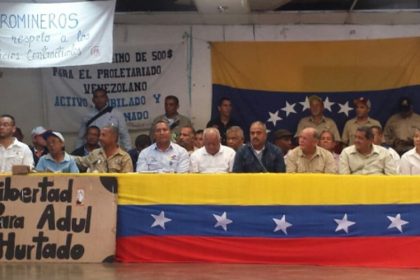En un artículo publicado por The Wall Street Journal (WSJ) sobre el rol que ha jugado la Fiscal General de la República Bolivariana de Venezuela, Luisa Ortega Díaz, en el último mes, se incluyen declaraciones de la funcionaria en la que vuelve a desmarcarse del gobierno actual y su última decisión de convocar una Asamblea Nacional Constituyente.
El texto recuerda lo que sucedió el 31 de marzo cuando, en medio de un discurso de presentación del Informe Anual del Ministerio Público (MP), La Fiscal señaló la inconstitucionalidad de las sentencias 155 y 156 , que representó su primer paso para marcar distancia del gobierno de Nicolás Maduro. En ese sentido, en estas declaraciones, la Fiscal hace un llamado al diálogo y a la negociación entre los venezolanos por el bien del país. “It’s time to hold talks and to negotiate. It means one has to yield on decisions for the good of the country.”, y además cuestiona el llamado a la paz que se hace sin dar el ejemplo. “We can’t demand peaceful and legal behavior from citizens if the state takes decisions that don’t accord with the law»: No podemos exigir una conducta pacífica y legal de los ciudadanos si el Estado toma decisiones que no están acordes con la ley, es como podría traducirse la frase anterior en inglés. Esta crítica no es nueva, pues ya la Fiscal el 25 de abril del año en curso, había cuestionado la actuación de otras instituciones del Estado como el Poder Judicial que ignoró para ese momento la solicitud del MP, encargado de conducir el proceso penal según la legislación venezolana, de liberar a 38 personas por no presentar pruebas suficientes para que se le abriera un proceso legal. Asimismo, en esa misma alocución aseguró que «la paz no se decreta, se construye con actuaciones, con ejemplo”.
Otro de los temas tocados por Ortega Díaz en la entrevista para WSJ fue lo referido al procesamiento de civiles en tribunales militares. “This is one of the issues that the state has to view with a lot of concern,”: Esta es una de las cuestiones el Estado debe ver con mucha preocupación.
“This constitution is unbeatable”… “This is Chávez’s constitution.”: Esta Constitución es inmejorable»… «Esta Constitución de Chávez», fueron las frases más contundentes de la máxima representante del Ministerio Público justamente en medio de una crisis política que se agravó cuando el 1ero de Mayo el presidente Nicolás Maduro convocó una Asamblea Constituyente para evadir, entre otras cosas, de manera fraudulenta, en opinión de Provea, la responsabilidad de garantizar los derechos políticos de los venezolanos una vez más, luego de haber suspendido el derecho al referéndum revocatorio y las elecciones de gobernadores que debieron realizarse en diciembre de 2016.
Artículo completo de The Wall Street Journal
Venezuela Attorney General Luisa Ortega Criticizes Regime She Serves
Comments in interview come as armored riot-control vehicles run over protesters in Caracas
Venezuela’s chief prosecutor Luisa Ortega on Wednesday in the Public Ministry Building in Caracas. PHOTO: MIGUEL GUTIERREZ FOR THE WALL STREET JOURNAL
Attorney General Luisa Ortega’s comments to The Wall Street Journal, in a rare interview, appeared to confirm her break with the hard-line leftist regime, which expects unquestioned loyalty as it wrestles with a growing surge of public unrest.
Mr. Maduro has intensified the government’s crackdown on protests and civil unrest that have cost at least 31 lives in recent weeks. On Wednesday shocking videos went viral on social media showing National Guard using armored riot-control vehicles to run over protesters in Caracas. The incident was confirmed by the mayor of the Caracas district of Chacao.
Venezuelan President Nicolás Maduro, center, in Caracas on Wednesday, when he officially launched his effort to have the constitution rewritten. PHOTO: FEDERICO PARRA/AGENCE FRANCE-PRESSE/GETTY IMAGES
Talk like that is unusual from a top-ranking Venezuelan official, particularly one like Ms. Ortega, who has long drawn the ire of rights groups for using what they considered kangaroo courts to lock away political foes and for allegedly helping the government bury charges of rampant corruption.
Ms. Ortega has denounced the use of armed civilian groups that do the government’s bidding. She has urged that the right of protest be respected and due process guaranteed, complaining of hundreds of arbitrary detentions by National Guard and intelligence police. Her comments undercut the government’s argument that the street violence embroiling the nation stems exclusively from right-wing agitators.
“We can’t demand peaceful and legal behavior from citizens if the state takes decisions that don’t accord with the law,” said Ms. Ortega.
Born into a rural family of eight, Ms. Ortega said she was captivated by the message of social inclusion propagated Mr. Maduro’s charismatic predecessor, Hugo Chávez, while she worked as a provincial criminal lawyer in the 1990s. She joined Mr. Chávez’s government as a legal adviser when he won the presidency and redrafted the constitution in 1999 and has since married a ruling party lawmaker.
That same constitution is what Mr. Maduro now says needs redoing. Rights groups have slammed that initiative as the unpopular leader’s last-ditch effort to avoid elections that polls show his party would easily lose.
The push to recast the constitution has also drawn stinging criticism from the U.S., where senators on Wednesday presented a bill urging President Donald Trump to take tougher actions to address Venezuela’s meltdown, including slapping sanctions on Venezuelan officials responsible for abuses and corruption.
Many of Ms. Ortega’s critics say she is looking to clean up her image in case of a change of government in Caracas. “I don’t trust her. She can’t just change her mask that easily,” said street protester Marta Corrales at a recent rally.
Others say her intentions are more sincere and come in response to her loss of powers as Mr. Maduro tries to consolidate control across the government. “What the prosecutor is doing seems to be genuine,” said Nizar El Fakih, a lawyer who has defended a host of high-profile Venezuelan political prisoners. In a polarized nation, he added, “she’s trying to carve out a third way, looking for a way to separate herself from Maduro.”
“This is one of the issues that the state has to view with a lot of concern,” the attorney general said in the interview, when asked about Mr. Maduro government’s growing use of military courts.
Ms. Ortega first made her discontent apparent in a surprise announcement on March 31. In an otherwise humdrum annual address, Ms. Ortega stopped to denounce a break in constitutional order after Mr. Maduro sought to transfer powers from the opposition-controlled legislature to his allies in the Supreme Court.
State TV promptly cut off transmission of her speech, which drew a standing ovation from those attending.
At other times, her criticism has been more subtle, and even cryptic. In a recent post on Twitter, she recommended her 411,000 followers to read an essay by 20th-century Italian philosopher Norberto Bobbio. Titled “Democracy and Secret,” it discusses how authoritarianism and oligarchic powers often mask themselves behind democratic principles.
“It’s not easy to decipher what game she’s playing, what she’s calculating,” said Andrés Bello Catholic University law professor Antonio Canova. “But what is clear is that she’s now turned into a problem for the government.”
Write to Anatoly Kurmanaev at [email protected]
Prensa Provea con información de The Wall Street Journal


